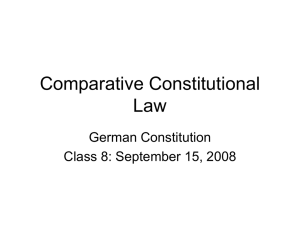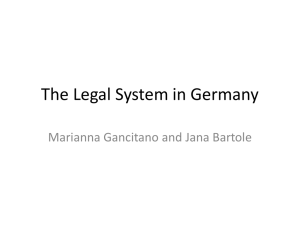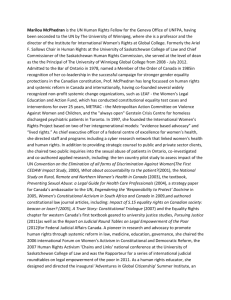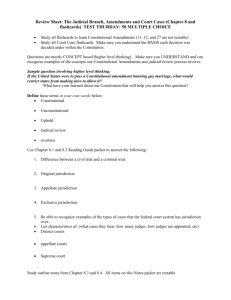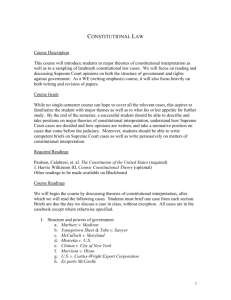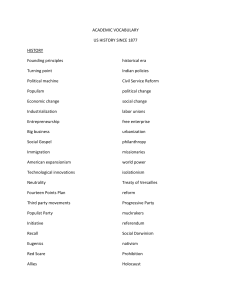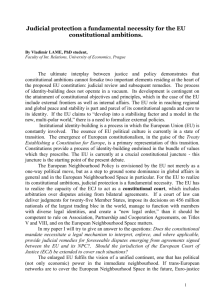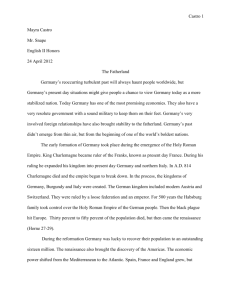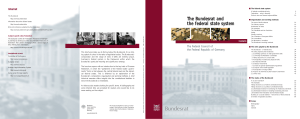What is the Basic Law?
advertisement
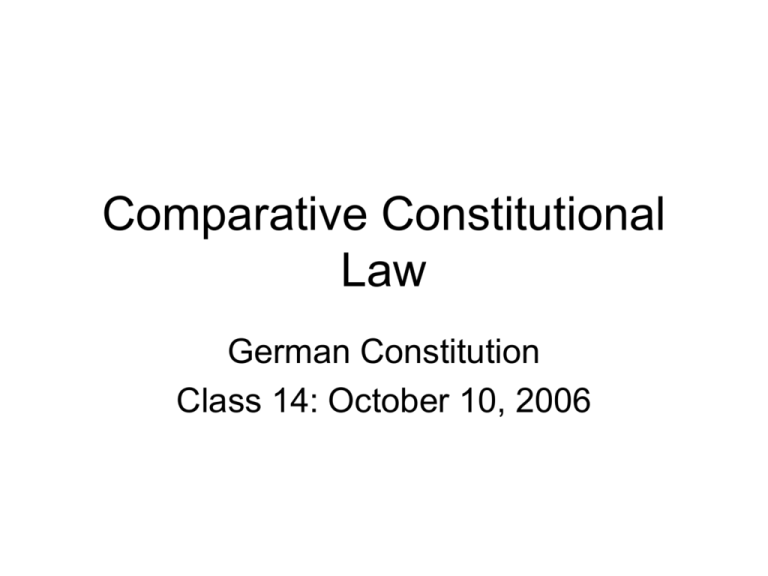
Comparative Constitutional Law German Constitution Class 14: October 10, 2006 Germany • Slightly smaller than Montana • Population is more than 80 million German Basic Law • What is the Basic Law? • How was it created? • What happened to the Basic Law on reunification in 1990? Germany • Example of successful redemocratization • Has been called a “militant democracy” • Much concern about history repeating itself Fundamental Structural Principles • What are the fundamental structural principles that the Basic Law makes clear are the basis of the German state? Fundamental Structural Principles • • • • • • Demokratie (Democracy) Republik (Republic) limited time Rechtstaat (Law State) Sozialstaat (Social Welfare State) Bundestaat (Federal State) Protection of the Environment (Art. 20a GG) Article 20 • Article 20 [Basic institutional principles; defense of the constitutional order] (1) The Federal Republic of Germany is a democratic and social federal state. (2) All state authority is derived from the people. It shall be exercised by the people through elections and other votes and through specific legislative, executive, and judicial bodies. (3) The legislature shall be bound by the constitutional order, the executive and the judiciary by law and justice. (4) All Germans shall have the right to resist any person seeking to abolish this constitutional order, if no other remedy is available. Bundespräsident Bundespräsident • Horst Köhler: elected 2004 (CDU) Article 20(a) • (1) Every person shall have the right to free development of his personality insofar as he does not violate the rights of others or offend against the constitutional order or the moral law. (2) Every person shall have the right to life and physical integrity. Freedom of the person shall be inviolable. These rights may be interfered with only pursuant to a law. Mindful also of its responsibility toward future generations, the state shall protect the natural bases of life by legislation and, in accordance with law and justice, by executive and judicial action, all within the framework of the constitutional order. Article 21: Political Parties • (1) Every person shall have the right to free development of his personality insofar as he does not violate the rights of others or offend against the constitutional order or the moral law. (2) Every person shall have the right to life and physical integrity. Freedom of the person shall be inviolable. These rights may be interfered with only pursuant to a law. Mindful also of its responsibility toward future generations, the state shall protect the natural bases of life by legislation and, in accordance with law and justice, by executive and judicial action, all within the framework of the constitutional order. Separation of Powers • Gewaltenteilung – separation of powers (Art. 20(2) GG) • The Basic Law allocates different tasks to legislature, executive and judiciary] • Certain institutions are delegated as legislative (e.g. Bundestag and Bundesrat), executive (Bundespräsident, Federal Government) and judicial (Federal courts, including Bundesverfassungsgericht (Federal Constitutional Court)) Bundestaat • Federal State (Art. 20(1) GG). • The decision to make Germany a federal state was grounded in historical experience; it was an attempt to prevent a repeat of any government similar to the centralized Nazi dictatorship. • Art. 30 gives the Federation powers only where specifically enumerated, although through amendments to the GG there has gradually been a shift in the balance of power toward the Federation. • The fear of a centralized German state leading to dictatorship led the drafters of the GG to limit the legislativep powers of the Bundesstaat to situations specifically enumerated by the GG> In some cases the Bundestaat’s power to legislate is exclusive, in others, concurrent, with the lander and sometimes it has the power to pass skeleton legislation. Bundestag: As 38-48 GG • Highest constitutional organ in Germany and one of 2 chambers of Parliament. • Legislative body directly elected by the German people • 614 Representatives now: they serve a 4 year term • The electoral system is a combination of proportional representation and direct election – this mixed system was designed to ensure that there are not too many minority parties in the Bundestag, because situation this had assisted in the rise of National Socialism in the Weimar Republic. • Mixed member proportional system: Electors cast 2 votes: one for member from his/her constituency, and the second for the Land list (majority/proportional voting) 299 constituency 299 party 16 overhang • Elects Chancellor (Arts. 63, 67 and 68 GG) Political Composition of the Bundestag • When was the last Bundestag election? • How many political parties have seats? Which parties? What percentage of members? • Note – to obtain representation in the Bundestag, it is necessary for a party to have at least 5% of the Land list votes and win seats in at least 3 constituencies. Bundestag: last election Sept 18, 2005 Upper House of German Parliament: Bundesrat As 50-53 GG • What does it do? Compare it to the Australian, Canadian, and United States Senates Executive Branch • Who is the current German Chancellor? Current Chancellor: Angela Merkel (CDU) • Ossi background • Chairman of CDU since 2000 • Protestant • Nickname “Iron Lady” (invoking Margaret Thatcher) • Became Chancellor in 11/2005 after a deal following 9/2005 Grand Coalition CDU/CSU/SPD Basic Rights • BASIC RIGHTS- Grundrechte • What are basic rights and where are they found in the Basic Law? Basic Rights • BASIC RIGHTS- Grundrechte • What are basic rights and where are they found in the Basic Law? • They are rules protecting against unlawful acts or omissions by the state. They ensure that human rights are respected. • The main basic rights are in Arts 1-19GG though there are also some grundrechtsgleiche Rechte, e.g. Art. 38, 33 (political participation), 103, 104 GG (rights of fair trial, due process) History of Basic Rights Provisions in German Constitutions • 1848 Constitution had basic rights • 1871 Reichsverfassung did not • 1919 Weimar Constitution had basic rights, but these were suppressed in the Third Reich Menschenrechte vs. Deutschenrechte • Some of the basic rights apply only to German citizens (Art. 8, 9, 11, 12, 16). • Should this be changed now that many (to the surprise of the drafters of the Basic Law, probably) seek to immigrate to Germany GG: Language of Duties as well as rights • Duties on state • Duties on individuals Limitations • Can the Basic Rights Be Restricted or Are They Absolute? • See Art. 19(1) which requires that any restrictions be pursuant to a generally applicable law, and also provides judicial recourse for violations of the Basic Law. • Some specific limitations in rights e.g. 8(1) right to assemble ‘peacefully’ • Art 18 provides that certain basic rights can be abused and forfeited (Art. 5(1), and (3), Art. 8, Art. 9, Art. 10, Art. 14, Art. 16(a)) if the Federal Constitutional Court declares the forefeiture temporary or permanent. • Principle of proportionality Chancellor: Angela Merkel (CDU) elected 2005

